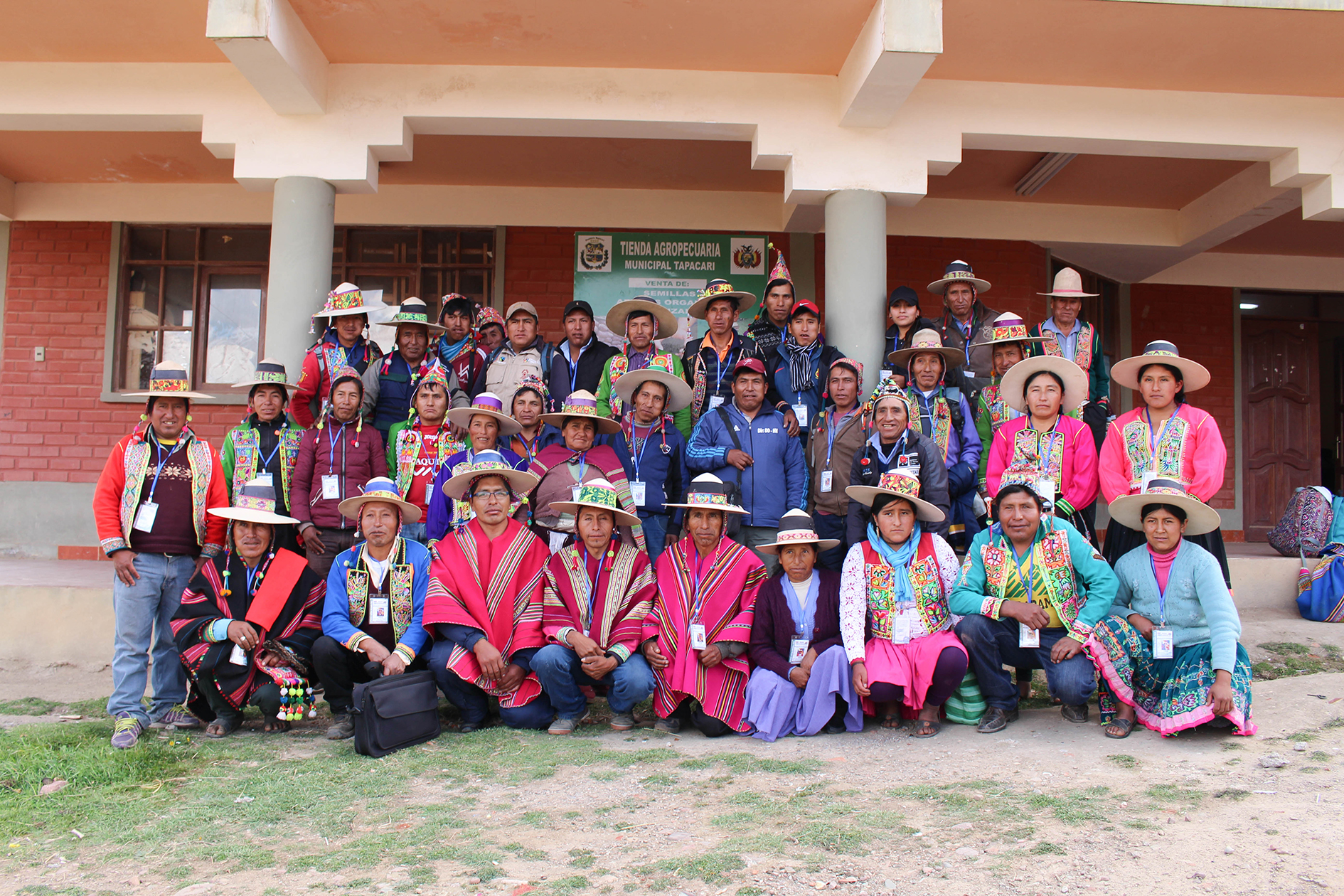Bolivia is in the process of consolidating a plurinational state with autonomies. In this context, Indigenous peoples are progressing in their demand for access to autonomy within the framework of their self-determination. Accessing self-government is a tedious and bureaucratic process, as numerous obstacles must be overcome. In this regard, the Original Autonomy of Challa stands out as a representative case due to the speed of its processing, the appropriation by the original authorities and the population, and its ability to follow up and coordinate with state entities.
In different stages of Bolivia’s history, Indigenous peoples and original nations have resisted processes of subjugation and subordination. Undoubtedly, colonization has been the cruelest period of domination. Even today, the Plurinational State, which recognizes Indigenous, original, and peasant autonomies, remains a contested arena. In fact, only eight Indigenous Governments have been established, their transformation based on placing decision-making in the hands of the collective. This approach contrasts with the conservative structures of municipal governments, where the highest decision-making body is the assembly led by the entire territorial population.
In the 1990s, the encroachment of logging companies on indigenous territories in the Bolivian Oriente led to high levels of corruption within the National Agrarian Reform Service (INRA). Consequently, the Indigenous March for Territory and Dignity in 1990 forced a debate on land distribution policy. As a result, in 1996, Communal Lands of Origin (TCOs) were recognized as “Geographical spaces that constitute the habitat of indigenous and original peoples and communities, to which they have traditionally had access and where they maintain and develop their own forms of economic, social, and cultural organization, ensuring their survival and development.”
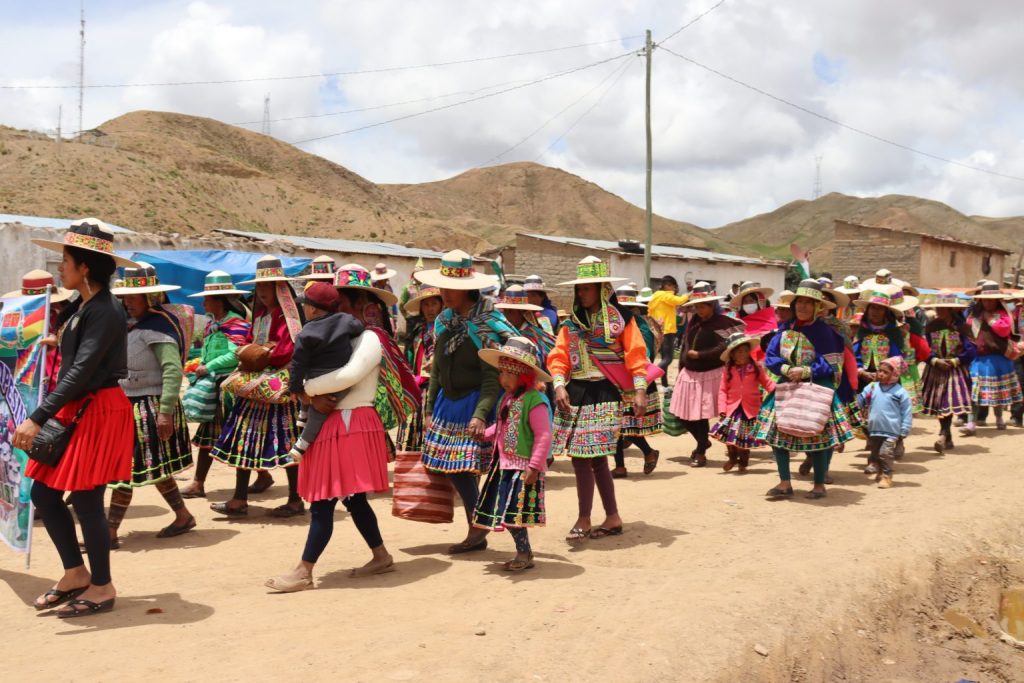
The territorial recognition of Challa
The territory of the Challa people is located in the department of Cochabamba and consists of ayllus with a strong Quechua-Aymara identity. The population descends from the Sora Nation and engages in agriculture, weaving, and livestock raising. Their three ayllus (communities), Urinsaya, Aransaya, and Majasaya, share culture, language, history, institutions, territoriality, and worldview. Throughout history, they have maintained a prolonged resistance against acculturation during the colonial and republican periods. Their territorial organization is dual: they are represented by the original authorities of the ayllu (communal mayors and kamanas) and by the four regional centers of the union structure.
Between 2000 and 2010, Challa demanded that the Bolivian State respect, recognize, and consolidate their twelve TCOs (Territories of Original Community Ownership), over which their 28 communities exercise collective control and management of natural resources to ensure their subsistence. According to Clemente Francisco Choque from Ayllu Aransaya, the organic decision was the best option to guarantee life in the communities and resolve organizational conflicts: “As the TCO of Challa, we have culture, we have territory, and we are known at the national level. And in this way, we also want to be recognized as the Autonomous Indigenous Original Government of Challa”.
In 2014, the original ayllus of Challa decided to pursue Indigenous Autonomy with the goal of exercising their own governance over their territory and natural resources, and strengthening their culture and worldview.
The ayllus of Challa managed to meet the requirements to achieve autonomy: ancestral character, governmental viability, and population base.
In 2014, the original ayllus of Challa decided to pursue Indigenous Autonomy with the goal of exercising their own governance over their territory and natural resources, and strengthening their culture and worldview. After several administrative processes with the Vice Ministry of Autonomies, the Autonomous Municipal Government of Tapacarí, and the National Institute of Statistics (INE) during 2018 and 2019, they met the requirements for autonomy: ancestral character, governmental viability, and population base. Finally, on February 20, 2020, the Jach’a Mara Tantachawi (Great Assembly) was held to consult on accessing Indigenous Autonomy through their own norms and procedures. The chosen decision-making method was acclamation: more than 3,000 residents gathered and expressed their will with a resounding “Yes”.
After the consultation, the authorities appointed 45 constituent members to form the Deliberative Body, which undertook the task of drafting the Autonomous Statute Project participatively in accordance with their own rules and procedures and in compliance with articles 275 and 292 of the Political Constitution. During the Jach’a Mara Tantachawi, Clemente Franciscano Choque, former Regional of the Ayllu Aransaya, expressed his satisfaction: “They asked us to be TCO, to have a minimum of 4,000 inhabitants, and to consult with the grassroots. Everyone present said ‘Yes’ to autonomy and we feel happy. Achieving autonomy requires a lot of work; we thought we would finish quickly, but it is not the case”.
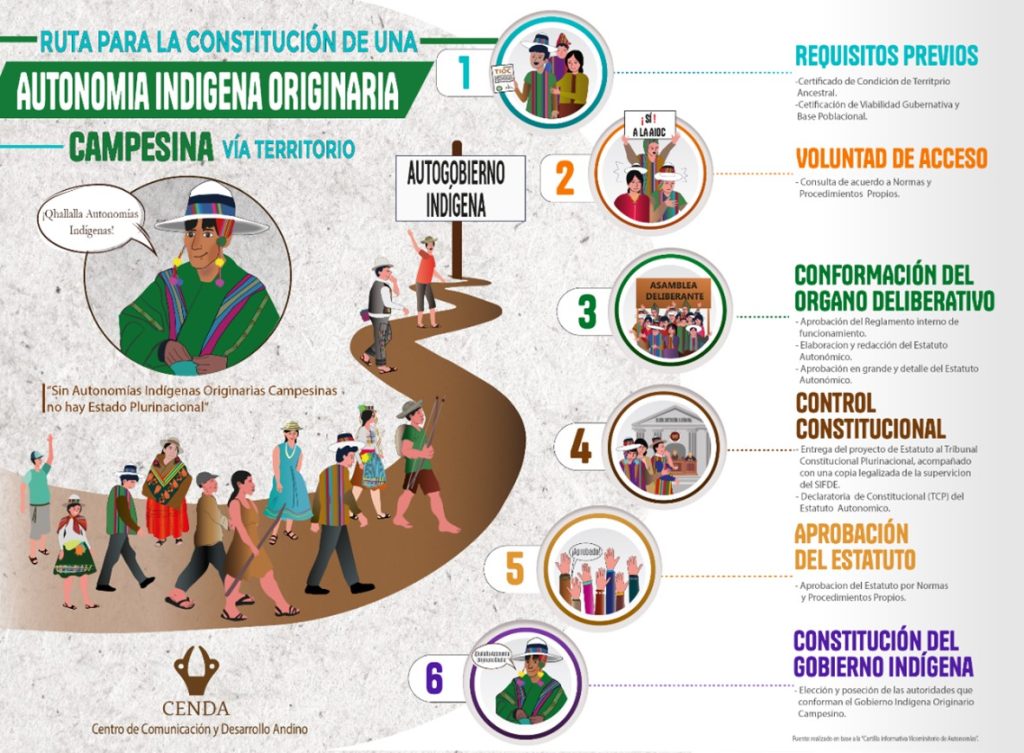
Dynamics and milestones of the Deliberative Body
After the Great Assembly, the first session of the Deliberative Body was held, the Board was formed, and the work plan was developed: it was decided to hold Territorial Assemblies in each ayllu to gather proposals from the grassroots to be included in the Statute. However, the Covid-19 pandemic and the political crisis forced them to suspend the drafting of the Statute. After the quarantine was over, work resumed in October, and regular sessions restarted with a massive presence of assembly members. Between December 5 and 8, Territorial Assemblies were held in the three ayllus to gather proposals that would serve as a starting point for drafting the Statute.
Throughout 2021, based on the information gathered in the Territorial Assemblies, four commissions were organized: 1. Fundamental Principles, 2. Human Development, 3. Government Structure, and 4. Territorial Planning. Subsequently, the content underwent a process of socialization and enrichment in plenary sessions that culminated in the proposal of the first draft. This draft was presented to the population in April 2021 with the accompaniment and support of state institutions: the Departmental Electoral Tribunal (TED), the Intercultural Service for Democratic Strengthening (SIFDE), magistrates of the Plurinational Constitutional Court, and the Vice Ministry of Autonomies.
On January 28 and 29, 2023, during an Ordinary Assembly session, the 45 titular Estatuyentes and 15 alternates approved the Project of the Statute of Challa’s Origin Autonomy in its entirety.
On January 28 and 29, 2023, the titular Estatuyentes and alternates approved the Project of the Statute of Challa’s Origin Autonomy in its entirety.
After a series of disagreements that hindered consensus-building, 99 percent of the second draft of the Autonomous Statute was approved during the January 2022 sessions of the Deliberative Assembly. However, the definition of the article related to the composition of the Challa Original Assembly (the number of representatives and their method of election) remained pending. Unable to make further progress, the Deliberative Assembly decided to refer the contentious issue to the organic bodies, stating that they would abide by the decision of the Ordinary Assembly of Authorities.
After several spaces for debate and reconciliation convened by their original and union structure, they managed to reach consensus, surpassing population representation and prioritizing their ancestral organization and their own procedures with representation for each ayllu. On January 28 and 29, 2023, during an Ordinary Assembly session, the 45 titular Estatuyentes and 15 alternates approved the Project of the Statute of Challa’s Origin Autonomy in its entirety. The session was supervised by representatives of the SIFDE, the Supreme Electoral Tribunal (TSE), and the Vice Ministry of Autonomies.
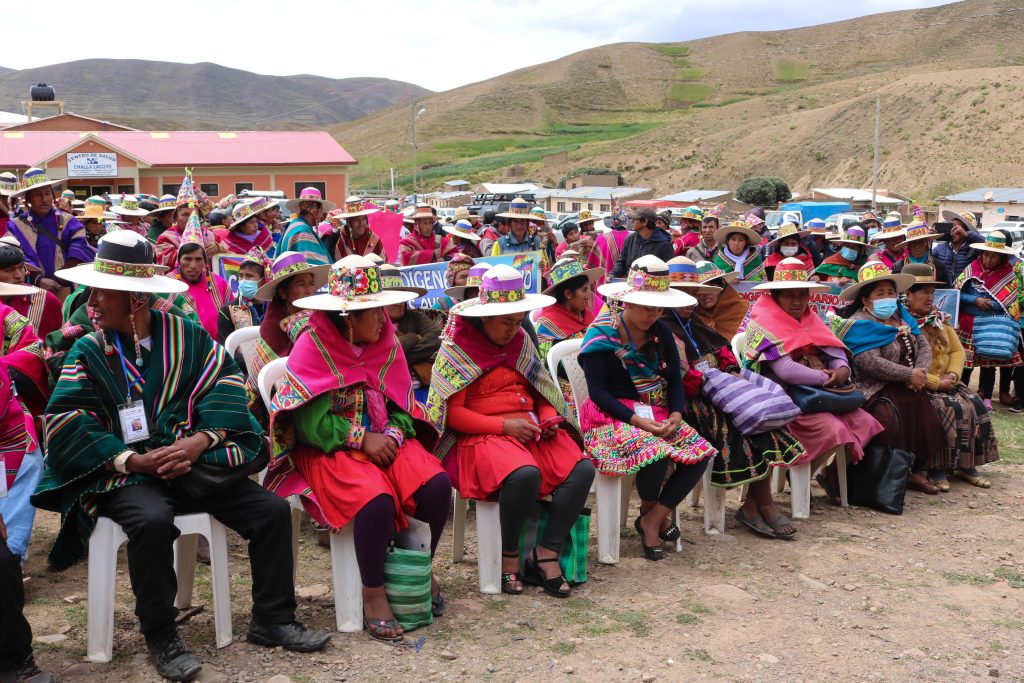
Prior constitutional review
After the approval of the Challa Statute Project, the Deliberative Assembly’s board reactivated the local Technical Commission to organize the statute’s documentation and submit it to the Plurinational Constitutional Court for its constitutional review, and subsequent entry into force as a basic institutional norm. Following the submission, Deputy Felicia Alejo Hidalgo expressed her excitement with the following words: “Women and children feel proud to show the work of the Challa people. We are moving towards indigenous governance; we have finished writing our Statute. I am proud for the new generations. We have made history”.
After careful monitoring by a commission of Estatuyentes and original authorities, the court issued the Plurinational Constitutional Declaration 0035/2023, which confirmed the partial compatibility of the project and ordered the incompatibility of the phrase “alguno de” (any of) in article 32, section III, which stated: “Every person is subject to the Original Indigenous Jurisdiction of Challa when any of the areas of personal, material, and territorial jurisdiction apply.” As a result, the Deliberative Assembly of Challa had to amend the project.
Once notified of the Constitutional Declaration, the original authorities immediately convened an ordinary session of the Deliberative Assembly of Estatuyentes with the objective of adjusting and expelling the phrase “alguno de” from article 32. Once this formality was completed, the Statute Project was resubmitted to the Plurinational Constitutional Court (TCP), which finally, on October 26, 2023, issued Constitutional Declaration 0044/2023 of “Total Compatibility” of the Challa Origin Autonomy Statute Project.
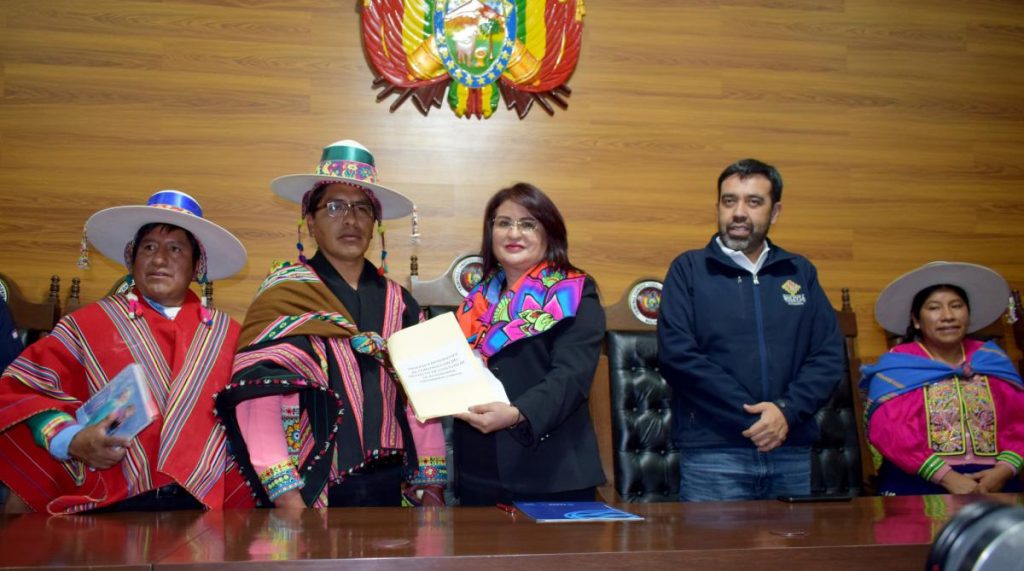
Approval of the Autonomous Statute
After the declaration of constitutionality, the original authorities convened the Gran Jach’a Mara Tantachawi for the approval of the Autonomous Statute through their own norms and procedures. On December 3, 2023, the meeting brought more than 4,200 people together and was attended by various public officials from the TCP, including the Vice Ministry of Autonomies, the Municipal Government of Tapacarí, and deputies from the constituency. Additionally, the approval process was supervised by the Intercultural Service for Democratic Strengthening of the Supreme Electoral Tribunal.
In this context, the original authorities demanded that the Plurinational Legislative Assembly approve the Law of Creation of the Territorial Unit to proceed with the election of their first Indigenous Autonomous Government. “The approval of the Statute through our own norms and procedures is a great achievement. We have overwhelmingly approved it through consensus and unanimity via an organic line. The deliberators have socialized the Statute up to the day before approval, and from today our Autonomous Statute comes into effect,” explained Eleuterio Flores, president of the Deliberative Assembly.
In the midst of the celebration, Severina Gutiérrez Larico, Estatuyente from the Urinsaya Ayllu, explained the importance of self-government: “For a long time, we Challa people have sought autonomy to govern ourselves. In the municipality of Tapacarí, we did not participate well because it is far away. That is why we seek original autonomy. We have walked for years, pushing, strengthening our territory and our lives. We have ancestral cultures, which we do not want to forget. Autonomy will remain for our children”.
“For a long time, we Challa people have sought autonomy to govern ourselves. We have walked for years, pushing, strengthening our territory. Autonomy will remain for our children”. Explains Severina Gutiérrez Larico.
We have walked for years, pushing, strengthening our territory. Autonomy will remain for our children”. Explains Severina Gutiérrez Larico.
There is a high degree of ownership of the autonomy process by the original authorities of Challa, which translates into a simultaneous action: drafting a bill for the Creation of the New Territorial Unit of Challa alongside representatives of the Territorial Limits Unit of the Vice Ministry of Autonomies, based on the titles of the 12 Indigenous Originario Campesino Territories already titled. The next step will be to approve an autonomous law for the election of the first Indigenous Autonomous Government of Challa and then elect the first authorities who will govern the Autonomy.
Challenges of Challa’s autonomy
Once its government is consolidated, the Challa Original Autonomy will focus on the normative development of the Autonomous Statute. The challenge is to properly regulate the functioning mechanisms of the Government Structure, where community democracy prevails and there is a high level of participation from grassroots communities. Along this path, Challa must coordinate with other already established autonomous governments to avoid making the same mistakes in governance. The Autonomous Statute, at its core, revitalizes ancestral organization, strengthens territorial management, and creates new forms of self-government.
The Challa Original Government will also have to overcome the limits established by the control and oversight systems established in Law 1178/1990 of Government Administration and Control (SAFCO) and adapt them to the concrete reality of their autonomy. Since the Bolivian government lacks the political will to reconcile the new design of autonomous statutes with suitable mechanisms for control and intercultural public management that effectively implement the exercise of indigenous rights, this perspective will have to be added to the demand for the creation of a Intercultural Public Management Law.
Challa’s autonomy has become a benchmark for procedural speed, appropriation by authorities and grassroots, and the state’s apparent willingness to consolidate autonomy.
One of the fundamental challenges is to maintain the enthusiasm and commitment of the population until the process is consolidated.
Challa’s autonomy has become a benchmark for procedural speed, appropriation by authorities and grassroots, and the state’s apparent willingness to consolidate autonomy. One of the fundamental challenges is to maintain the enthusiasm and commitment of the population until the process is consolidated. Unlike in the autonomies of the lowlands, interests regarding the control of renewable and non-renewable natural resources are less. Additionally, it is necessary to strengthen and revalue local knowledge, without losing sight of the new technologies necessary to adapt to the transformations being experienced, particularly as a result of rural-urban migration.
In this context, Challa’s Autonomy must focus on three aspects: developing a territorial management plan for the sustainable development of the territory; training technical personnel with public management skills to facilitate the implementation of the provisions contained in the Statute; and, finally, drafting the law for the creation of the territorial unit and the procedure for the election of the new original authority with the aim of establishing the Indigenous Government. There is still a long way to go.
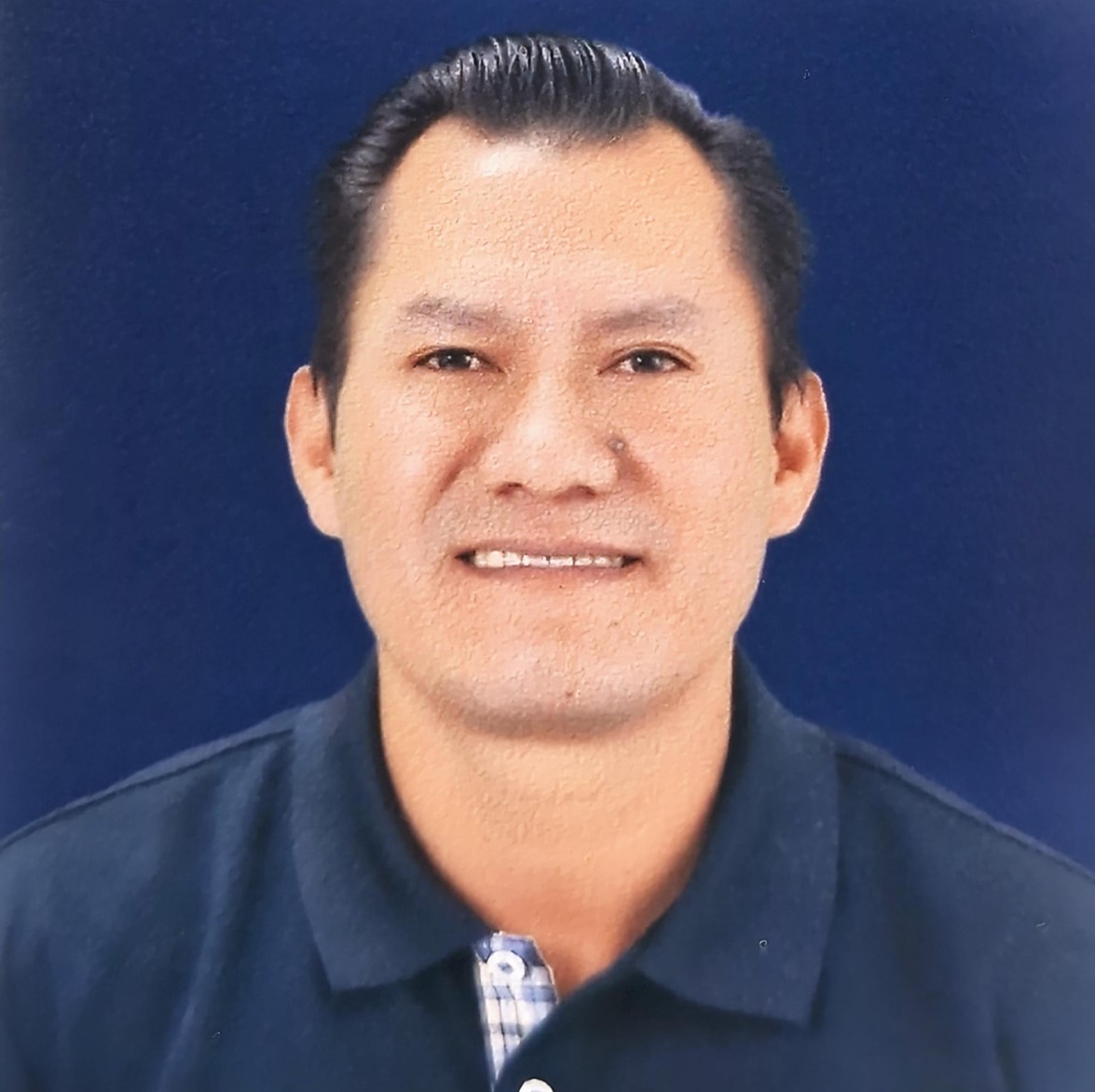
Sergio Vásquez Rojas is the Executive Director of CENDA and a specialist in Indigenous Law and Agroenvironmental Law.
